|
|
|
Sort Order |
|
|
|
Items / Page
|
|
|
|
|
|
|
| Srl | Item |
| 1 |
ID:
130826
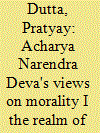

|
|
|
|
|
| Publication |
2014.
|
| Summary/Abstract |
Acharya Narendra Deva strongly believed that the Gandhian ideas based on morality and ethics could be the only solution to meet the basic needs of a society both developing and developed. It was thus that even after independence, he wielded the Gandhian weapon of Satyagraha most effectively to ?ght every form of injustice against the oppressed and the depressed in the then Indian society. Like Gandhi, he gave the highest priority for the removal of rural backwardness and he was in favour an innovative technology that could help in bringing an all round development in a developing society. He was a profound thinker who could analysis political, economic and social problems in their totality and his socio~political ideas about the solution to the problems facing the nation and society was exclusively original in its entirety. Narendra Deva accepted the value of morality and ethics of Gandhi and practised it fully throughout his whole life. It was Gandhi, who ?rst demonstrated the powerful effect on his countrymen of renouncing wealth for the sake of human service rather than personal salvation and Deva had trodden the same pathway into lndia's heart. Gandhi and Narendra Deva acquired their moral strength through renunciation, much as lndia's ancient sageswere supposed to obtain magical powers through their austerities. Their magic was singleness of purpose and an iron will. When Deva joined the Indian political
struggle under Gandhian leadership, the Mahatma once told him to simplify life and he took his words to heart. They never urged anyone else to follow their way of life and went their own way with a striking serenity. As a leading intellectual of outstanding mould, Acharya Narendra Deva had a forceful urge to bring about social justice, processed through a strong vein of idealism and always expressed deep concern for the down- trodden lndian masses. He remained a path?nder of the socialist movement in India and strongly believed that freedom was the first postulate for the establishment of the socialist society in India. He felt that without political independence the socialist programme could never become a reality. Narendra Deva always emphasized the moral and cultural elements of Marxism, but in the Indian socio-political context, he said that the class con?ict was already in existence and the real question was on whose side you were going to stand. Moreover, it was wrong to assume that the capitalist class had no vested interest in the freedom struggle. He, therefore, viewed that the socialists should create consciousness among labour, convince them that their interest would be well protected inn the freedom struggle and should broaden the base of that struggle by organizing the toilers. That is why; Gandhi and Deva wanted the historical stream of the cultural progress of India, in order to sustain the flow of continuity. In fact, Gandhi and Narendra Deva's entire socio-political ideas were ofa new social order purely based on universal love, ahimsa, morality and most importantly the role of ethics in Indian politics. Gandhi's ideal society was a non-violent and stateless society and repudiated state on ethical, historical and economic grounds. Unlike Marx, Gandhi and Deva persistently put emphasis on moral force and on the - realization of one's own self and there was no place for violence in their whole socio-political philosophy. The purpose ofthe article is to highlight the impact of ethics and morality on Narendra Deva's socio-political ideas and its relevance in the 21" century.
|
|
|
|
|
|
|
|
|
|
|
|
|
|
|
|
| 2 |
ID:
130814
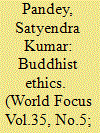

|
|
|
|
|
| Publication |
2014.
|
| Summary/Abstract |
Buddhist Ethics is imbedded in the fabric of Noble Eightfold Path which prescribes certain do's and don's in order to get rid of suffering and attain the highest goal of Eternal Bliss (Nirvana). Though, the basic purpose of Buddhism is to make the people aware of existential problem of suffering and to enable them to get rid of it, it has touched almost all aspect of human life. The formulation of Buddhist ethics in fom1 of moral code is one of them.
Ethics generally deals with human conduct and is concerned with questions pertain to what is good and bad, what is right and wrong, what is virtue and vice, what is just and unjust, what are our duties and rights. There are divergent views with regard to the scope and nature of ethics. Modern ethical philosophers belonging to the Analytic school of philosophy consider it their task merely to analyses and clayey the nature of ethical concepts or theories. For them, ethics constitutes a purely theoretical study of moral phenomena. They do not consider it their province to lay down codes of conduct, which they deem to be the function ofa moral teacher, a religious leader or a prophet.' However, some of the Existentialists philosophers consider it the duty of philosopher to recommend ways of life or modes of conduct which they consider desirable for the purpose of achieving some end which they regard as valuable. Kierkegaard, for instance, considers that there are three stages of life, namely, the aesthetical or sensualist, the ethical and the _religious. He indirectly recommends in his philosophy that we pass from one state to another. The aesthetical or sensualist way of life. according to him, leads to boredom, melancholy and despair, so it needs to be trans?gured in the ethical stage. and so on? When we peruse the Buddhist Ethics in this background, we see that it has an analytical study of ethical concepts and theories as well as positive recommendations to lead a way of life-' for attainment of the highest good, the supreme eternal bliss (nirvana) as well as the realization of ultimate truth
|
|
|
|
|
|
|
|
|
|
|
|
|
|
|
|
| 3 |
ID:
130808
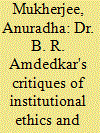

|
|
|
|
|
| Publication |
2014.
|
| Summary/Abstract |
Ethics and morality are the milestones of civilization in the true sense of the term. These concepts again are not static but evolve with greater implications and subtler nuances as humanity strives to grow towards perfection- the ultimate end of existence. ' whether biologically or spiritually. In the context of Indian thought, the traditional, age-old dictums of ethics and morality. having undergone numerous interpretations and changes have experienced a new set of values,' however latent in the traditional interpretation of Dharma or Niri- with the advent of" nationalism, the emergence of a new nation-state and the concurrent vision of human rights. The Constitution of India fully recognizes the moral as at par with the modem, that is, the western ideals of morality in the realization that in the context of Dalit uprising in modern India, the traditional ideals of ethics and morality are to be reviewed. Obviously this shows that what is legal should be ethical and moral or rather. what is ethical and moral tnust have its place in law. It is from this perspective that the modern-day Dalit struggle against injustices, age-old as they are. are to be seen and Dr.B.R. Ambedkar's initiation to this struggle was aimed at bringing ethics and morality to work at the state level, subjugating the Nili forest while lawgivers to take a backseat before the universal laws of morality. To understand Ambedkar's stand on the place of ethics and morality in Hinduism, one must see the reasons that made him strike out at the roots of Hindu social ethics. The Hindu social life was traditionally ruled by Dilemma. Dharma guided a Hindu's'Iife from birth to death by a set of rules strictly laid out for everyone in society. The observation of these rules was morality and the underlying ethics of these duties and rights was ?rst ofall, societal good, i.e., good for 'all. The second part of this ethics was that by observing this social morality, an individual will attain perfection. In accordance with these concepts, the Dharmas/zastras dictate the functions ofthe state and the king. The Nili and Dandanili emanate from one source and with one ideal- that is to maintain the social order by arranging for the speci?c duties of each and every member of society. Consequently. rights came as group rights and institutional rights as laid out in the Dharamshastra'. And over and above everything was the belief in the law of Karma that sanctified the rule of l/Z7I'l7aS/1I'uII7(l, or ones station in life as prescribed by onc's birth. These two essential features of Hindu society made it a highly stratified one so that the passage of' centuries only tightened the rules and the rituals pertaining to these two rules. The solemn and noble hymns of Rigveda. where the philosophy of Vedic seers and poets as the world being one and where everyone was the other's kin. I Va.t'zzdlmibu Kzzrumba/(um )' is the spirit of the ancient Indian Vedic realization. The utmost ideals of human dignity with the universal ethics of righteous behavior and the universal morality of conscientious behavior were preached in their fullest glory. . '
|
|
|
|
|
|
|
|
|
|
|
|
|
|
|
|
| 4 |
ID:
130825
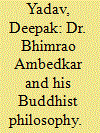

|
|
|
|
|
| Publication |
2014.
|
| Summary/Abstract |
Early Life
Bhimrao Ramji Ambedkar was born on I4 April 1891, popularly also known as Babasaheb, was an Indian jurist, politician, philosopher. anthropologist, historian and economist. A revivalist for Buddhism in India, he inspired the Modern Buddhist movement. As independent India's first law minister, he was the principal architect of the Constitution of India. Born into a poor Mahar family, Ambedkar campaigned against social discrimination, the Indian caste system. He converted himself to Buddhism and is also credited with providing a spark for the conversion of hundreds of thousands of lower caste members to Buddhism. Ambedkar was posthumously awarded the Bharat Ratna, India's highest civilian award, in 1990. Having earned a law degree and doctorates for his study and research in law, "economics and political science from Columbia University and the London School of Economics, Ambedkar gained high reputation as a scholar and practiced law for a few years, later campaigning by publishingjoumals advocating political rights and social freedom for India's untouchables. He is regarded as a Bodhisattva by some Indian Buddhists. though he never claimed it himself.
|
|
|
|
|
|
|
|
|
|
|
|
|
|
|
|
| 5 |
ID:
130802
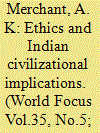

|
|
|
|
|
| Publication |
2014.
|
| Summary/Abstract |
The major civilizations of in human history have been associated with the major religious systems. Some
3,000 years ago Zoroastrianism was the religion of the "glory of ancient Persia," - the Persia that conquered" Babylon, Palestine, Egypt, and the Greek city-states. A few centuries later Judaism was the basis of Hebrew culture, which some philosophers such as Karl Jaspers regards as the greatest in history. And Jewish law has formed the I basis of common law and jurisprudence in countries all over the world. Western culture, until the rise of modem science, was dominated by Christianity. The teachings_ of Islam that burst upon world stage some 1400 years a go preserved and developed the Hellenistic heritage and gave algebra and other sciences. It was probably the greatest civilization the world had seen until the rise of the - Industrial Revolution began to transform Western culture. Today, the tumult of our age of transition is characteristic of the impetuosity and irrational instincts of youth. its follies, its prodigality, its pride, its self- assurance. its rebelliousness, and contempt of discipline.
|
|
|
|
|
|
|
|
|
|
|
|
|
|
|
|
| 6 |
ID:
130787
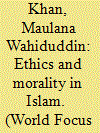

|
|
|
|
|
| Publication |
2014.
|
| Summary/Abstract |
The concept of human values is by its very nature universal. That is why we find uniformity in the teachings on human values in all religions. If there are any differences on this subject, they relate to points of reference, i.e. to religious books, rather than to the human values themselves.
|
|
|
|
|
|
|
|
|
|
|
|
|
|
|
|
| 7 |
ID:
130789
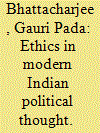

|
|
|
|
|
| Publication |
2014.
|
| Summary/Abstract |
Political _thought is concerned with the state, and the sovereign power of the state is legally unlimited, though it is not arbitrary. It is exercised with the objective of realizing some interest of the state. With the rise of the concept of democracy there arose, not only the importance of the individual but also the long struggle between state sovereignty on the one hand, and individual freedom on the other, ultimately giving rise to the concept of democracy. Democracy does not mean s-imply majority rule. It implies majority rule with full rights of all. The simple view of majority rule gave rise to the misleading concept of democratic dictatorship, and in a democracy an individual, even if he becomes a minority of one, is entitled to enjoy all the rights embodied in the constitution. Democracy therefore implies rights of all and rule by the majority opinion as ascertained periodically.
|
|
|
|
|
|
|
|
|
|
|
|
|
|
|
|
| 8 |
ID:
130822
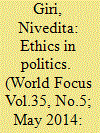

|
|
|
|
|
| Publication |
2014.
|
| Summary/Abstract |
Till recently when India passed through its l6th general Elections, the election Commission of India appealed Indian citizens to select candidates and dump the criminals and the corrupt ones. It also urged the voters to sign a pledge to be ethical while casting their votes in the coming Lok Sabha elections. The Election Commission also appealed the voters to cast their votes without fear or greed, and without keeping caste, religion and creed consideration in mind. The commission's letter also stated that electing a candidate is not merely a citizen's right but his/her responsibility. Ethics and morality have been the hallmark of public life in India since ancient times. Rulers were expected to observe stricter ethical values. Ethics and politics, in other words, were inseparable. This ethical and moral legacy was inherited by its national leaders, who demonstrated a high degree of probity and honesty in public life during the freedom struggle. The early national leaders and political philosophers believed that politics without morality is a thing to be voided. However, in recent years there is a general feeling that all is not well with the Indian political system which is functioning under great strain. It has been noticed and concerns are being expressed over the general decline of values in public life. Recent trends in politics, however, appear to have created an impression as if, the capacity of Indian democratic system to ensure integrity in public life is increasingly going down.
|
|
|
|
|
|
|
|
|
|
|
|
|
|
|
|
| 9 |
ID:
130823
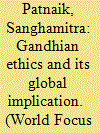

|
|
|
|
|
| Publication |
2014.
|
| Summary/Abstract |
Politics is the most crucial human activity that involves governance. Ethics is the set of principles those regulate the activity of governance and administration. Before we focus on Gandhian Ethics it is necessary to focus on the two schools of thought - Idealism and Realism. Idealism was an approach to international politics based upon liberal assumptions and principles. lt was optimistic as it envisioned a world.in which law, institutions and diplomacy replaced power, competition and use of force. This School was represented 'by St. Simon, Richard Cobden. Aldous Huxley, Russell, Mahatma Gandhi, Wilson and Margaret Mead. It gave emphasis on the role of education and international institutions to bring a better world. It focused on the Positive side of human nature. It proceeded with the assumption that the harmony of the interests was not impossible. Hans J. Morgenthau is the main exponent of realist theory. For him the central focus of realism was power. He de?ned power as "man's control over the minds and actions of other man"(Morgenthau,l993). He emphasized on: lnevitability of conflict among nations, Centrality of Power, Ever -present threat of war.
|
|
|
|
|
|
|
|
|
|
|
|
|
|
|
|
| 10 |
ID:
130791
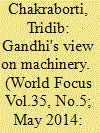

|
|
|
|
|
| Publication |
2014.
|
| Summary/Abstract |
Mahatma Gandhi held a distinctive place in the history of Indian freedom movement as well as in the
momentous evolution from tradition to modernity. During the time-period ranging from l9l6 to 1947,
Gandhi had revealed his luminous dexterity and methods which made him the vanguard of the nation,
by the relentless logic of history. He was an iconoclast. Who quivered the basics of the powerful British Empire in India through multiple novel means such as non- violent, satyagraha, . Fasting, hartals, non'-cooperation and mass civil disobedience. Gandhi was a multifaceted virtuoso who applied his mind to glitches of human distress. His social ideas amply exhibited a deep and abiding consciousness of the fundamental reformation of the Indian society. In the economic sphere, he ardently believed that the economic salvation of India exclusively depended on the economic regeneration of vast millions of Indians living in the rural areas. ln line with such a policy. he championed the promotion of small scale village and cottage industries, which could offer productive employment on a long-term basis to the common masses of India. At the political level, Gandhi felt that the state was a means of intimidation, since it was likely to demoralize the cherished essential freedom of individuals. As an individualist, Gandhi judged that individuals could enhance their traits through truth and non-violence, drenched with an ambience of freedom.
|
|
|
|
|
|
|
|
|
|
|
|
|
|
|
|
| 11 |
ID:
130792
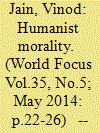

|
|
|
|
|
| Publication |
2014.
|
| Summary/Abstract |
Earlier the world as a whole was a conflict -zone. People living in a particular region had norms and morality which served them well. But that morality was at the cost of people living in other regions because of conflicts between them. So, that morality involved inhumanity towards those living outside their regions. Now due to growth of science, industry and technology, the world seems to be coming closer to all; the unfamiliarity that prevailed earlier between people of different regions is diminishing and familiarity is growing. People around the globe are becoming aware of this. innumerable institutions that are taking shape are spreading the awareness about the inadequacy of old thinking, ideas and morals. Take Europe for instance. Different regions or countries of Europe were indulging in prolonged wars with each other. This, after the Second World War, changed. They realized the futility of it all, and established various institutions like the European Union. Thus reducing and extinguishing the con?icts between them, leading thereby not only to a prolonged period of peace but to unheard of prosperity.
|
|
|
|
|
|
|
|
|
|
|
|
|
|
|
|
| 12 |
ID:
130790
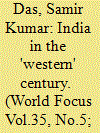

|
|
|
|
|
| Publication |
2014.
|
| Summary/Abstract |
In a paper written not quite long ago, I argued that the rise of Asia including in particular such powers as China, and India in recent decades takes places in a century that continues to remain western. As I concluded.
|
|
|
|
|
|
|
|
|
|
|
|
|
|
|
|
| 13 |
ID:
130809
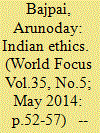

|
|
|
|
|
| Publication |
2014.
|
| Summary/Abstract |
The contemporary global community continues to be in throes of multiple problems accumulated in the course of growth and development of human civilization. The problems of violence within and among nations: rising terrorism and organized crimes in different parts of the globe; increasing poverty and hunger: threatening dimensions of food and energy crises and to cap it all pending catastrophe of climate change and other forms of environmental degradation. it is not that the global community- and nations collectively or individually are not aware of these challenges or they have failed to corrective actions. We are more aware of these problems than any time in the history of mankind. Also. we have put in place various strategies. policies and mechanisms to manage. and solve these challenges. Even global community has suddenly woken up to the call for switching over to the alternative vision of sustainable development. However. the alternative sustainable development strategy seems faltering amidst of unsustainable ideas and practices inspired by materialistic progress and over emphasis on sel?sh interests of nations and individuals alike. The moot question is how the prevailing development paradigms fashioned and refashioned to suits the needs of evolving globalized economy is capable of facing these challenges? What are its ethical foundations? What alternative ethical framework or vision we can evolve? And ?nally, how the Indian ethical framework is relevant for this alternative vision?
|
|
|
|
|
|
|
|
|
|
|
|
|
|
|
|
| 14 |
ID:
130827
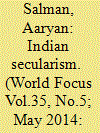

|
|
|
|
|
| Publication |
2014.
|
| Summary/Abstract |
"I believe in a religion based on universal and all-embracing principles which have always been accepted as true by mankind - the primeval eternal an religion, which means that it is above the hostility of all human an creels whatsoever. " - -Swami Dayananda Saraswati. There can be little debate on the In?uence of co Religion on Human History. The overwhelming impact of Christianity, Hinduism, Zoroastrianism, Judaism, or Islam on Civilization is seen not only in the cultural pl: semblance and value system which emerge from their - D2 teachings, but also re?ects in the effects they've had Ul on mankind. un an Believers and Unbelievers alike have acknowledged the profound in?uence of religion on ha individuals, societies and on humanity's collective life. the Religion was and is a power that's here to stay with above both the western and eastern hemispheres! that will On the other hand, Religion was and is still the considered a pariah' by Western Secularism! According are to historian R. Scott Appleby "Religion, at last, can no be longer be ignored". This was one of ?ve "unintended, unforeseen" consequences of 9/ l 1. HI In present day, challenges are manifold both co at domestic and at international level. Most political of con?icts end up passing through the prism of religion» pr. or ethnicity and are claimed to be the trigger factor in cl: many con?icts. The relationship between Religion and special Con?ict is complex.3'And Religion is at the heart of the Secularism Debate as Ethnicity and Religion have been an the building blocks of an lndividua1's Identity. Appleby hi: de?ned religion as 'the human response to a reality m: perceived as sacred
|
|
|
|
|
|
|
|
|
|
|
|
|
|
|
|
| 15 |
ID:
130788
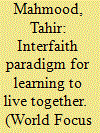

|
|
|
|
|
| Publication |
2014.
|
| Summary/Abstract |
Man has always lived, and its still living, under two parallel social control mechanism - religion and law - and guidance for all aspects of human life is found in one or the other of these, often in both. Both are equally significant. Paradigmatic precepts teaching people how to live together in peace and harmony despite their different religious affiliations are found both in the age-old faith traditions and the national and international laws of time. I will briefly sample here relevant provisions of both but, being a law-man ignoramus in matters of religion, will begin with law.
|
|
|
|
|
|
|
|
|
|
|
|
|
|
|
|
| 16 |
ID:
130820
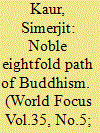

|
|
|
|
|
| Publication |
2014.
|
| Summary/Abstract |
When the society was on turmoil and the individual was in a state of fix on account of the prevalence of numerous views with regard to the different aspects of life, Gautarna, the Buddha made the world aware of an ethical means to get rid of suffering and the attainment of Eternal bliss. Buddhism originated in 6"' century B.C.E.' beneath the Bodhi-tree was disseminated by Siddehartha Gautam, the Buddha and his contemporary disciples in the different nook and comer of Ancient India 'for the good of the many, for the happiness of the many, out of compassion for the world". Later, the Indian merchants trading in the foreign lands, and the missionaries dispatched by the Mauryan King Asoka carried and introduced it beyond the frontier of ancient India, the land of its origin. It originated in the backdrop of spiritual unrest and intellectual ferment in the country. During that period the Brahmajalasutta records the prevalence of sixty-two views' related to the difference aspects of human existence while the Samafi?aphalasutta enumerates the views of six heretical thinkers - Pakkuddha Kaccana, Makkhali Gocala, Ajita Kesakambli, Purana Kassapa, Niganmha Namaputta, and Safijaya Velammhiputta', who were cotemporary to the Buddha. These views were, though conflicting in themselves, deeply rooted in the psyche of the people. Contradictions existing "in these views were perplexing the people and complicating their life. In no way these views were providing any comfort, peace and happiness to them. Rather, a natural question crept in their mind as to which of them was true, and how could one attain the eternal bliss?
|
|
|
|
|
|
|
|
|
|
|
|
|
|
|
|
| 17 |
ID:
130796
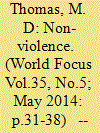

|
|
|
|
|
| Publication |
2014.
|
| Summary/Abstract |
Ethics and Indian civilization, political thought; global implication is a valid search into the global implications of the ethics grounded in the national ethos of the ideological, political, religious, social and cultural dimensions of the great civilization the word India stands for.
|
|
|
|
|
|
|
|
|
|
|
|
|
|
|
|
| 18 |
ID:
130793
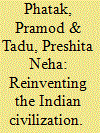

|
|
|
|
|
| Publication |
2014.
|
| Summary/Abstract |
"1 have travelled across the length and breadth of India and I have not seen one person who is a beggar, who is a thief Such wealth I have seen in this country, such high moral values, people of such calibre, that I do not think we would ever conquer this country, unless we break the very backbone of this nation, which is her spiritual and cultural 'heritage, and, therefore, I propose that we replace her old and ancient education system, her culture, for if the Indians think that all that is foreign and English is good and greater than their own, they will lose their self-esteem, their native self culture and they will become what we want them, a truly dominated nation. "
These words have been attributed to Macaulay's address to the British Parliament on 2"" February, 1835.
Though the authenticity is, of late, being questioned by certain quarters the detractors have yet not succeeded in convincingly proving their point and hence we take the above quoted words at face values. Needless to say that they speak volumes about the kind of society that India was.l For all those people who may still not believe this largely historical truth that India was a culturally rich and prosperous society, we would like to quote below Robert Clive's views about the city of Murshidabad presently in West Bengal which says that 'Murshidabad is a city of extensive, populous and rich as the city of London, with this difference, that there are individuals in the first possessing in?nitely greater property than in the last.
|
|
|
|
|
|
|
|
|
|
|
|
|
|
|
|
| 19 |
ID:
130824
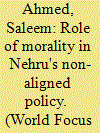

|
|
|
|
|
| Publication |
2014.
|
| Summary/Abstract |
Basis of India's Foreign Policy
India has the heritage of an ancient civilization and culture, and its foreign policy formulated after independence which reflected its rich culture and intellectual political tradition. Indian foreign policy makers had before them the teachings of Kautilya, the realist. who had recognized war as an important instrument of power in foreign policy. At the same time, they were also impressed by the Buddhist traditions of Ashoka, the Great, who advocated peace, freedom, morality and equality. Nehru chose Ashoka's tradition and incorporated the ideals of international peace, and paci?c settlement of international disputes. lndia's foreign policy largely determined in accordance with the ideals of our freedom struggle, Gandhian philosophy of non violence and the fundamental principle of Indian tradition of Vasudhaiva Kutumbkam (means the World as one family). Nehru's personality has had a direct impact on lndia's foreign policy which is largely based on her history and culture. Speaking in Lok Sabha in March 1950, he argues that, 'it should not be supposed that we are starting on a clean slate. It is a policy which flowed from our recent history and from our national movement and its development and from various ideals we have proclaimed.
|
|
|
|
|
|
|
|
|
|
|
|
|
|
|
|
| 20 |
ID:
130817
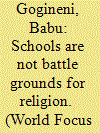

|
|
|
|
|
| Publication |
2014.
|
| Summary/Abstract |
l received recently a communication on Face Book that was rather disconcerting - it was typed in large font in Telugu, one of the Dravidian languages of South India. lt was shrieking that an unnamed school's authorities were considering suspension of a teacher as that teacher made students shout 'Jai Shri Raam' or 'Hail Lord Raama'.
Ø Can I not praise my Lord. Raama in my own country, it wails. I
Ø Was it Lord Raama or Jesus Christ that was born in India, it demands angrily.
Ø Does India belong to the Hindus or to the westerners, it asks mindlessly.
Ø Why should Hindu children sing Christian prayers, it asks with justi?cation.
I Pointing out that almost all Missionary schools in India ban girl pupils from wearing the bindi on the forehead and bangles on their hands, it asks for banning of such Christian Missionary Schools for violation of children's rights.
What is all this about? Lord Raama in Hindu mythology Lord Raama is one _of the l0 avatars or incarnations of Lord Vishnu. immensely important for the Hindus of North India, Raama is revered for his obedient ?lial morality, for his valiance as a warrior and for his rule as an ideal king.
|
|
|
|
|
|
|
|
|
|
|
|
|
|
|
|
|
|
|
|
|